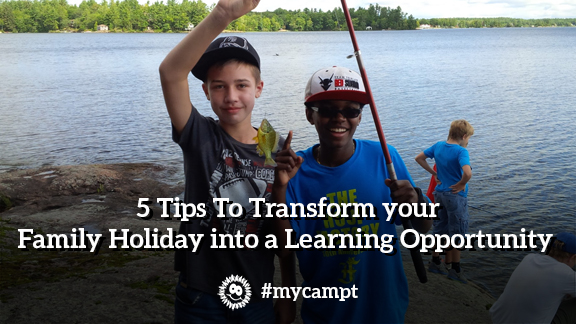Written by: Martine Brouillet
Your highly-anticipated family holiday is just around the corner and you’ve already made your list of things to do. But you may have overlooked one of the big opportunities your family holiday can provide: a fun and exciting learning opportunity for you and your child!
Family vacations are one of the best times to treat your child to a memorable learning experience that is both fun and engaging! Not sure what to do?
Keep reading to see our list of the top 5 things you can do to transform your family holiday into a learning opportunity for your child. And if you haven’t already, check out How To Transform a Family Holiday Into A Learning Opportunity (Part 1).
5 Tips To Transform Your Family Holiday Into A Learning Opportunity
#1 Ask Your Child To Select One Thing To See Or Do
Sometimes we can get so caught up in planning the perfect itinerary that we forget our children can be an ideal resource to help us plan the vacation schedule. Simply commit to spending 15 minutes with your child to research an activity, event or a landmark that they would like to include in the trip.
If your child is not yet comfortable with using the Internet, help them research the top things to do in your chosen destination and ask them to select one thing they would like to add to the itinerary. Not only will this lighten your load in planning your trip but it is a fun way to help them learn fun facts about the destination before you leave. Children will then discover the importance of preparing and planning when they are getting ready for a trip or an experience. Had we not done this research, would we have known to look for this landmark? Are we utilizing our time better on that day because we discovered that these 2 landmarks are close to one another? Or that line ups at this museum are shorter at a certain time? Perhaps there is a hiking trail in the area where you are camping that features specific types of trees or flowers that are most likely to be seen there?
#2 Give Your Child Fun Homework To Do
While on-site, try giving your child a fun to-do list that encourages them to explore and learn more about your destination – whether you’re in Europe or on a camping trip! Things on the to-do list might be to take a picture by a famous landmark or a specific type of tree. This exercise feels like a fun treasure hunt for kids and gets them to learn new things, interact with others and initiate their curiosity. By doing a bit of research with them, you can easily connect the social science curriculum with the flora and fauna that surrounds them. What kinds of fish are living in this lake? What kind of mammals live in this area/forest? Are they nocturnal? What are the chances of seeing them? Are pigeons more likely to be spotted in this city or seagulls? Why? What is the most common native tree or flower in this region? Did we see one?
#3 Help Your Child Learn How To Get Around
In many parts of the world, the options for transportation are limitless. Whether you choose to take the metro, walk, bike, taxi or drive – there is always a hidden opportunity to get your child involved in the process of getting from point A to point B.
Tweet this: “Tell me and I forget, teach me and I may remember, involve me and I learn.” @CampTournesol
Likely, your children might tend to surrender the responsibility of getting around to you. But it doesn’t have to be that way! When you are making your way to a landmark, get your child involved in looking at the map of the city and ask them to try to locate the address of wherever you are headed. Not only will this boost their confidence by making them feel more independent, but it is also a vital skill that will continue to come in handy in the years to come. To push the math skills further, have them calculate the cost of taking the subway versus a taxi versus whatever other mode of transportation is available. What is the cost compared to the time it takes with each mode of transportation, is it worth a bit more to arrive earlier? This will help them understand the value and importance of comparison shopping when making a purchase in the future and make them feel empowered by having facts and tools to make the best decision.
#4 Encourage Your Child To Master The Art of Budgeting
Give your child a small amount of cash in the local currency for any treats or souvenirs they would like to buy – including that double scoop ice cream cone! Let them know that the goal is to make their “petty cash” last until the end of the vacation. This exercise will help them learn how to budget and use their math skills in real, everyday situations. Depending on their grade level, push this further by having them calculate the equivalent value in Canadian dollars for each purchase and maintain a ledger that you will have prepared together to enter their ins and outs with a running balance. The habit of maintaining a budget and controlling expenses is one of the best financial skills they can adopt for future financial health.
#5 Keep a Journal
Learning how to express thoughts in writing is a key skill that is important throughout a child’s entire academic career and beyond. And one of the best ways to practice writing is outside the classroom when your child can write creatively. A holiday journal makes for the perfect time for your child to enjoy writing creatively about their experiences on your family holiday.
For the younger children, why not try making our “Memory Book” in advance of your departure. They can use this booklet as their journal for the trip.
This exercise helps younger children improve their printing and grammar, and it helps older children translate their thoughts, discoveries and experiences into the written word. A wonderful memento to re-discover years later to reminisce about your great vacation.



